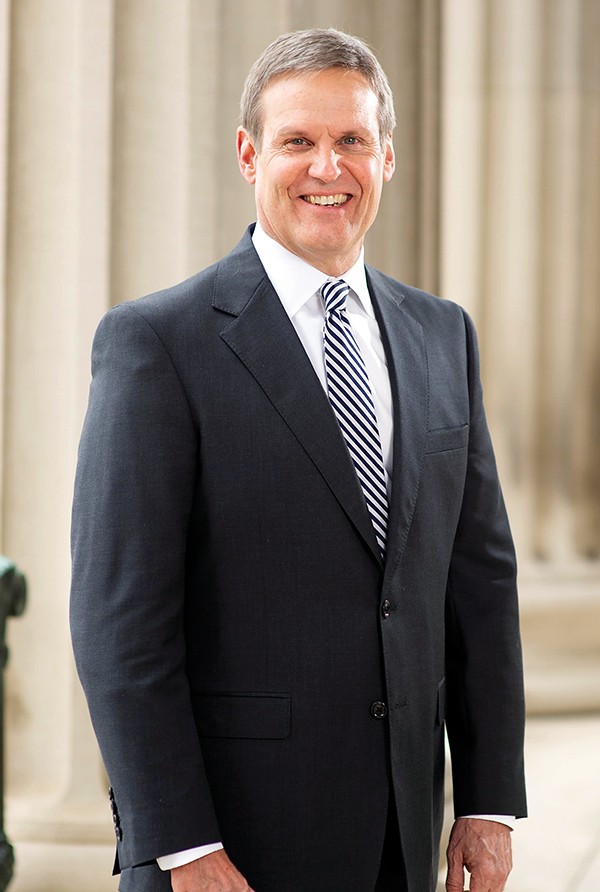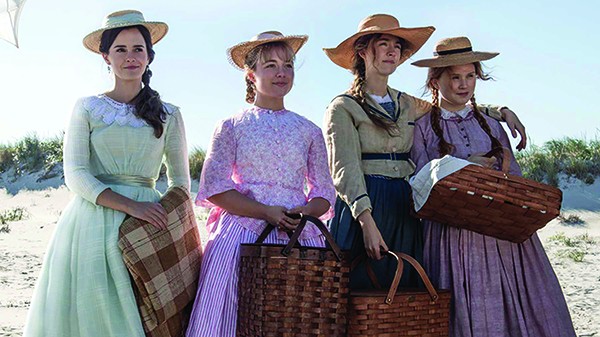The 2020 session of the Tennessee General Assembly is underway, and in many ways its tone was set even before Republican Governor Bill Lee got to deliver his annual State of the State message Monday night.
Lee, whose speech would dabble in much human rhetoric, had already expressed his compassionate side the week before when he declared forthrightly that “the United States and Tennessee have always been … a shining beacon of freedom and opportunity for the persecuted and oppressed, particularly those suffering religious persecution,” and vowed to continue offering resettlement opportunities in Tennessee to these displaced peoples. And Lee’s continued embrace of the principle of criminal justice reform was evident even before he restated it in the State of the State.
But there is another Lee, equally committed, it would seem, to a more divisive attitude toward state policy, and this Lee, too, was fully on record before he addressed the state on Monday night.

Governor Bill Lee
There is the Lee who has not only recommitted himself to the revival of last year’s moribund “fetal heartbeat” bill but has vowed to seek the kind of total ban on abortion that would set back or eliminate any sense at all of women’s reproductive freedom.
There is the Lee whose agenda, focused as it is on industrial recruitment and holding the line on taxes and spending, is content to pursue incrementalism at best in most policy spheres. “I see you,” Lee kept assuring his statewide listeners in the climax of his speech. State Senate Democratic Leader Jeff Yarbro of Nashville answered for the Democrats in his party’s official response: “The Governor may see, but it’s not clear that he understands.”
Yarbro added: “Our state is still in the basement compared to the rest of the country when it comes to public school funding, when it comes to hospital closures, drug overdose deaths, violent crime, and medical debt. We lead the nation in children losing health care, and [have] lots of counties where there are fewer businesses and fewer jobs today.”
Perhaps the most telling depiction of the gap between Lee’s vision and that of the Democratic opposition has to do with their differing price tags on educational spending. Both visions involve freeing up more money. But, after spending considerable time in the State of the State itemizing what seemed a blizzard of new initiatives, Lee proudly totaled it all up as an additional $600 million spent on education. The Democrats, in a caucus announcement two weeks ago, called for a minimum increase of $1.5 billion, more than twice as much.
But the polarities of the parties do not explain all the divisions of legislative Nashville, nor do they offer ideological guideposts to every issue. In many ways, Lee is close to the most conservative fringe of his party — not in the point-by-point way that, for example, his defeated 2018 GOP rival Diane Black, a serious right-winger, would have been, but in most of the ways already hinted at by his agenda from last year.
 Jackson Baker
Jackson Baker
Lee delivers State of the State
It is no accident that a bill allowing the state to overrule local school boards on licensing charter schools and a measure funding “education savings accounts” (read “vouchers”) at the expense of Shelby and Davidson counties’ public school systems were two of his most eagerly sought goals, touted all over again in the State of the State.
His is not the right-wing populism of Trumpians or the erstwhile Tea Party; it smacks more of the paternalism of the Republican Party’s seigneurial wing, once dominant not only on the Eastern seaboard but among the country’s landed gentry and its upscale suburbs. And Lee’s conservatism on social issues attaches him to an age that is, for better or for worse, largely bygone among Gen Xers and Millennials but whose moral positions still loom large in the Tennessee hinterland.
The governor would probably accept the old George W. Bush term “compassionate conservatism” as descriptive of his views. He does not, for example, see his ideas about education as regressive. He is apparently sincere in believing that he is merely allowing state government to circumvent obsolete structures and inherited restrictions to endow less fortunate citizens in the name of benevolence.
Although Democratic legislators from the big-city enclaves of Memphis and Nashville, both directly affected, were and remain the most conspicuous opponents of vouchers, they have by no means been alone in resisting this legalized diversion of taxpayer funding into private schools via the medium of parent applications. The voucher bill of 2019 famously passed the House of Representatives last year by a single vote, and then only after then-House Speaker Glen Casada, in determined pursuit of the governor’s agenda, suspended voting for upwards of an hour while he lobbied members of the Republican-dominated body, looking for a GOP member willing to break a tie by doing a vote change from no to aye. He finally found one in Representative Jason Zachary of Knoxville, but only after Zachary extracted a promise that the bill would not apply to his own Knox County or to anywhere else except Shelby and Davidson.
Casada was, as it turned out, much too devious for his own good in a multitude of ways and ended up the 2019 session losing a vote of confidence in his own party caucus and was deposed as speaker.
 Jackson Baker
Jackson Baker
State of the State
The new speaker selected by House Republicans, Representative Cameron Sexton of Crossville, was and is a sworn foe of vouchers. One of the most intense conflicts of the current session is the disagreement between Governor Lee and Speaker Sexton over whether to expedite the voucher process, as Lee desires, or to delay it, as Sexton, and considerable numbers of both Republicans and Democrats, wants to.
As the 2020 session began, the governor found himself in conflict with virtually the entire GOP super-majority over another issue — that of refugee resettlement in Tennessee, for which, as indicated, Lee has taken a favorable stand. Sexton and 49 other Republican members of the House — including Tom Leatherwood, Kevin Vaughan, and Mark White of Shelby County — have signed on to a bill sponsored by Ron Gant of neighboring Fayette County, HB 1929, which, in the language of its caption, “prohibits the governor from making a decision or obligating the state of Tennessee in any way with regard to resettlement of refugees unless authorized by joint resolution of the general assembly.”
Donald J. Trump could not have said it any firmer. This is the same kind of prohibition which Republican state Senator Brian Kelsey of Germantown managed to incorporate in a measure that forbade Lee’s gubernatorial predecessor, Bill Haslam, from proceeding with an acceptance on Tennessee’s behalf of the $1.5 billion reserved for the state annually under the Obama-created Affordable Care Act of 2009.
The Gant bill, and the overwhelming Republican backing of it, afforded House Democratic Leader Mike Stewart of Nashville the occasion to express both an undoubtedly sincere outrage and a priceless opportunity to probe at and widen a potential divide in GOP ranks.
Said Stewart: “There are some decisions that are better left up to the executive branch, and this is definitely one of those. The governor has made the absolute right moral decision; one that is completely his to make, based on information that he has at his disposal and without legislative second-guessing.”
From the competitive point of view, “legislative second-guessing” is the main — and perhaps the only — weapon the Assembly’s Democrats have at their disposal given the numerical disproportion they are faced with.
And, while, as indicated, Lee and the Republican super-majority are not necessarily on the same page legislatively on all issues, the members of the Democratic minority in the General Assembly have much more to second-guess about in Lee’s proposed agenda for 2020 than does the GOP majority.
Several actions taken right off the bat in the 2020 session put Lee and the Democrats at loggerheads, especially in relation to the so-called “social issues.” First and most notorious has been the governor’s announcement on January 23rd that he would support a bill that he intends to be a run-up to the aforementioned ultimate total ban on abortion.
The governor’s bill will contain a version of the “fetal heartbeat” measure that handily passed the House and nearly made it all the way through the 2019 session but was effectively halted by Senate Speaker/Lt. Governor Randy McNally on the verge of Senate passage because of doubts that it could withstand legal challenge.
Lee has indicated that his bill, which has McNally on board, will contain other “fail-safe” provisions, including bars to abortion at various points of the pregnancy calendar that have passed legal muster in prior anti-abortion measures.
Summing up the views of legislative Democrats, State Senator Katrina Robinson of Memphis — calling the Lee proposal “one of the most divisive issues brought to any state legislature” — denied the validity of the term “pro-life,” saying that “it’s disturbing that the governor would place more effort to build a litigation strategy around abortions than he would to solve issues facing families like health care, child-care access, and funding public education.”
Similarly, though for the most part they have somewhat discreetly deferred comment to spokespersons for rights organizations, like Chris Sanders of the Tennessee Equality Project, Democrats have challenged the use by Lee and other Republicans of the nomenclature “religious freedom” to justify various legal restrictions aimed at members of the LGBTQ community.
A notorious case in point was another early-bird measure of the 2020 session, a bill passed by the state Senate and signed by Lee that allows faith-based adoption agencies to avoid penalties for declining placements for foster care or adoption on grounds of “religious or moral convictions” — in effect, to exclude LGBTQ parents from the process.
That kind of measure, like the on-again-off-again efforts in the General Assembly to bar transsexuals from gender-specific public locations (the so-called “bathroom bills,” in legislative parlance), normally engender public attention far beyond the borders of Tennessee and can arouse opposition even from Republican legislators — like state Senator Steven Dickerson of suburban Davidson County, who warned of potential backlash from business interests to the adoption bill’s passage.
This is as good a point as any to note that, despite the “us-vs.-them” struggles inherent in the two-party system, not every situation that comes up for discussion or votes in the General Assembly is of a forbiddingly binary nature. Cooperation across party lines happens all the time, as it generally has in the case of criminal justice reform, in which Republicans, expressly including Lee himself, have joined hands with Democrats in eliminating or reducing the post-release legal shackles that in times past made it difficult for ex-felons to find a place as useful, productive members of society.
One frequent participant in such joint actions is the aforementioned state Senator Kelsey, paragon of the far right and author of such partisan measures as the currently pending Senate Joint Resolution 648, which seeks to enshrine in the state constitution a right-to-work provision. The term “right-to-work” is considered a misnomer by opponents of the concept, who include virtually all trade unionists and union sympathizers. It basically allows workers to enjoy all privileges earned by unions for members of a work force without having to join or pay dues to a union, and it further protects such non-union workers from sanctions of denial of employment.
Laws establishing right-to-work have been passed before in Tennessee, and by majority-Democratic legislatures, as Kelsey shrewdly pointed out in introducing his constitutional-amendment resolution in the Senate Labor and Commerce committee last week.
Even so, Democratic state Senator Raumesh Akbari of Memphis, one of her party’s rising stars, cast the lone vote against the measure in committee, saying, “Laws like Senator Kelsey’s amendment have kept wages low and health benefits scarce for workers everywhere they’ve been enacted — including Tennessee. I believe it is wrong to use the state constitution to tie the hands of future lawmakers who may see value in the rights of workers to negotiate better pay and stronger benefits without interference from politicians.”
Still, Kelsey has in the past partnered with Democrat Lee Harris, now Shelby county mayor and then a state senator, in legislation to safeguard the Memphis aquifer from pollution and with various Democrats in criminal justice legislation. Though he probably has more detractors among Democrats at large than any other GOP legislator, he can work across the party line.
Most recently, Kelsey is a co-sponsor with state Representative Antonio Parkinson of Memphis of HB1594/SB1636, potentially path-finding legislation that “prohibits a public institution of higher education from preventing a student athlete from earning compensation as a result of the use of the student athlete’s name, image, or likeness.”
One final example of how issues, even cutting-edge ones, can defy the binary principle: A bill that made its initial appearance in 2019 was SB1429/HB1290, a measure that would modify the contractual rights of homeowners’ associations to prohibit long-term rentals. Discussion of the bill, both last year and this year, which has brought it to the brink of passage, yielded a pattern of conflicting rights and complexities within complexities, and, as of now, it needs only approval by the House Calendar and Rules Committee to get to floor votes in both chambers.
It’s a vaguely worded “caption bill” in the sense that its listed nomenclature in the legislative record is but the most general and uninformative guide to its content. It’s one of those you-had-to-be-there things, but its purport is to make it easier on absentee corporations (on “Wall Street,” as opponents of the bill put it) to convert the homes they acquire into rental properties, despite explicit prohibitions or obstacles in the protocols of homeowners’ associations.
It’s a suburban issue, a complex one in which each contingent claims to have justice on its side and each side accuses the other of violating property rights. Win or lose, in the long run it will invite litigation. In the meanwhile, it is one more reminder that there isn’t necessarily a Democratic or a Republican way to do the public’s business. Sometimes not even a right or a wrong way.
 Liz Seabrook
Liz Seabrook 



 Lorna Field
Lorna Field 
 Love Doesn’t Hurt
Love Doesn’t Hurt 



 Marc Pegan
Marc Pegan 
 Jackson Baker
Jackson Baker  Jackson Baker
Jackson Baker